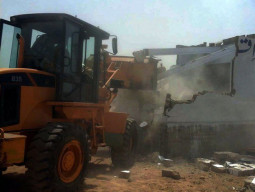
The election commission and Sindh government have been ordered to complete the delimitation of constituencies in Karachi “as soon as possible”, according to the Supreme Court’s directives a year earlier.
A five-member apex court bench was on Wednesday hearing the implementation of Karachi violence suo motu case about the progress made by the authorities to curb violence in the beleaguered port city.
Redrawn since 2002, the “voter boundaries” have been a bone of contention among major stakeholders in Karachi. Rival political parties claim the constituencies have been drawn on ethnic lines to influence polling results. These differences have claimed hundreds of lives over the recent years.
When Chief Justice Iftikhar Muhammad Chaudhry took up the Karachi violence case last year as the city was going through one of its bloodiest summers. The apex court in its various recommendations included delimitation of constituencies to split the influence of certain political or ethnic groups.
After one year, the court has again taken up the case expressing displeasure over non-implementation of its orders.
On Wednesday, Election Commission of Pakistan (ECP) secretary Ishtiaq Ahmed Khan appeared before Justices Anwar Zaheer Jamali, Khilji Arif Hussain, Sarmad Jalal Osmany, Amir Hani Muslim and Muhammad Athar Saeed as they resumed hearing.
When the judges questioned him about what was hindering the delimitation process, the secretary replied that the Sindh government was supposed to carry out a population census, define the limits of administrative division of police and revenue departments, and develop a consensus among political stakeholders. “Once this is done, the election commission can carry out delimitation at a later stage,” he argued.

Constituencies could not be re-determined as it required a consensus among political stakeholders under Section 6 of the Delimitation Act, 1974, continued Advocate General Abdul Fattah Malik.
The ECP official asked the court to grant two months to complete the process.
When the Sindh chief secretary was asked about the matter, he said that the constituencies could not be bifurcated since administrative limits of the police and revenue departments have yet to be determined after the enforcement of the new local government system. Only 16 police stations have their limits determined, he added.
Dismissing their assertion that administrative division had anything to do with constituencies’ delimitation, the court directed the chief secretary to produce the relevant material in court to prove his stance.
“Show your strength,” Justice Jamali remarked, commending the election commission as a strong institute.
After this, Ishtiaq Ahmed Khan proposed holding a meeting with the election authorities today. Another meeting will be held to seek the opinion of Karachi’s political stakeholders on Friday.
As the ECP secretary assured the court that the election commission would soon present a blue print in the court, the judges observed that constituencies should be redrawn in such a manner that nobody holds an upper hand and people are free to do politics.
related story on page 14
Published in The Express Tribune, November 29th, 2012.
COMMENTS (1)
Comments are moderated and generally will be posted if they are on-topic and not abusive.
For more information, please see our Comments FAQ

1732274008-0/Ariana-Grande-and-Kristin-Chenoweth-(1)1732274008-0-165x106.webp)















Court is only pointing fingers and not doing its job, which is to punish the criminals and terrorists. If they do that then life for the common people will be much better. demarcation of boundaries will not do anything, if anything it will increase the turf wars, especially since the courts are not interested in providing justice and promptly punishing the terrorists when they are presented to them.